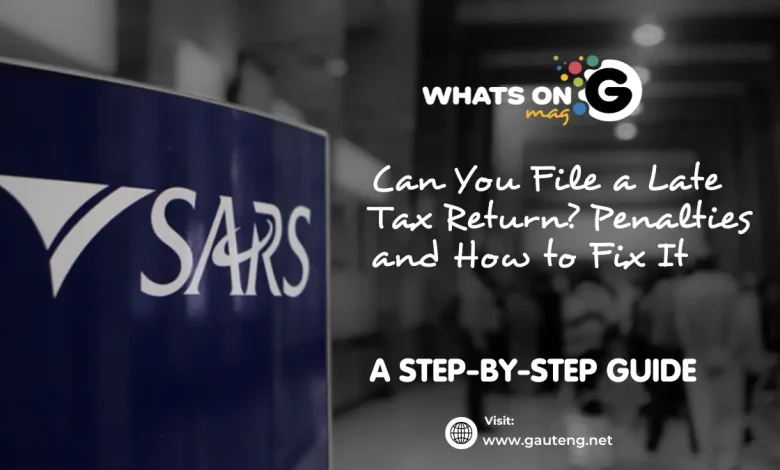Can You File a Late Tax Return? Penalties and How to Fix It

Filing a tax return can induce anxiety, especially if you have missed the official deadline. Many South Africans wonder: Is it possible to file a late tax return, what penalties may arise, and crucially how can you remedy the situation? Here, we cut through the jargon to give you a clear, up-to-date answer to these vital questions.

ALSO READ: Understanding Your ITA34: How to Read the Assessment SARS Sends You
Understanding SARS Deadlines
The South African Revenue Service (SARS) launches a nation-wide tax season annually. For 2025, individual taxpayers must submit their returns by 20 October 2025. Provisional taxpayers have until 19 January 2026. Filing late, or not at all, can result in serious trouble even if you do not owe any tax.
What Happens When You Miss the Deadline?
Once the deadline has passed and your return is still outstanding, SARS considers you non-compliant. You remain responsible for submitting your return. Failure to file triggers administrative penalties. These penalties are not once-off fines; they accrue every month the return is late.
Administrative penalties may range from R250 to R16,000 per month for each outstanding tax return. SARS bases the penalty amount on your taxable income. Penalties can accumulate for up to 35 months of non-compliance creating a staggering financial burden for persistent delays.
How SARS Enforces Compliance
SARS has become more vigilant in recent years. Their systems identify non-compliance using advanced data-matching tools and international income reporting. Dodging the process is no longer possible. Extended non-compliance may even result in criminal charges, including prosecution for tax evasion.
SARS sends penalty notifications via SMS, email, or post. Even individuals living abroad may receive these notices if they have outstanding returns from the tax years 2007 onwards.
Can You Still File a Late Tax Return?
Filing late is better than not filing at all. SARS allows you to submit overdue returns using its eFiling platform or at a physical SARS branch. After you file, the system calculates and displays all penalties and interest owed. This applies regardless of whether or not SARS had previously notified you of the outstanding return.
How to Pay or Fix Administrative Penalties
You have options to address your penalties:
- Pay the Penalty: Settle the amount owing directly using SARS’s payment channels. This brings you back into compliance quickly.
- Request for Remission (RFR): If you believe the penalty was applied unfairly or due to valid circumstances, you may request a remission on SARS eFiling. You must provide reasons for late filing. SARS reviews these on a case-by-case basis.
- Lodge a Dispute: If your request for remission is denied, you can formally object and appeal the penalty. Navigating this dispute process requires you to follow the instructions provided in your penalty notice.
Practical Steps for Filing Late and Fixing Returns
- Log Into SARS eFiling: Use the eFiling portal to locate the outstanding return.
- Submit the Return: Complete and file the return for the correct tax year.
- Review Penalties: Check the calculated penalties and interest.
- Request Remission: If you have good grounds (such as not being liable to file), submit a Request for Remission on eFiling.
- Pay Owed Amounts: Make payment to prevent further penalties.
- Correct Mistakes: If your return has errors, use SARS’s “Request for Correction” function to fix it.
SARS will not remove penalties unless you have strong and valid reasons. It is crucial to act quickly, as repeated neglect leads to more severe action.
What If You Are Not Liable to File?
Some taxpayers may receive penalty notices even if they believe they are not required to file. For instance, those with annual PAYE income below R500,000 and no additional sources of income do not need to file a return. However, mistakenly issued penalties still require attention. File the required return to resolve the penalty and submit a Request for Remission to explain your situation.
Why You Should File, Even If Late
Besides financial stress, non-compliance with SARS can harm your credit record, cause business licence issues, and restrict access to financial services like loans. Filing your return, even after the deadline, will always put you in a better position than failing to file at all.
SARS Penalty Table for Late Filings
| Taxable Income | Monthly Penalty (per return) |
|---|---|
| Up to R250,000 | R250 |
| R250,001 to R500,000 | R500 |
| R500,001 to R1,000,000 | R1,000 |
| R1,000,001 to R5,000,000 | R2,000 |
| R5,000,001 to R10,000,000 | R4,000 |
| R10,000,001 to R50,000,000 | R8,000 |
| Over R50,000,000 | R16,000 |
Penalties apply per outstanding return, charged monthly for up to 35 months.
Key Takeaways and Action Points
- File all outstanding returns immediately, regardless of how late they are.
- Pay or challenge penalties as soon as possible.
- Use SARS eFiling for ease, transparency, and faster updates.
- Seek professional help if you face disputes or complex cases.
“Failing to file, even when no tax is owed, can lead administrative penalties of up to R250 to R16,000 per month for each return outstanding. In more severe cases, persistent non-compliance may result in criminal charges, including prosecution for tax evasion,” notes Tax Consulting SA.
Do not ignore notices from SARS. Fix the problem sooner rather than later to avoid an escalating financial and legal headache.




